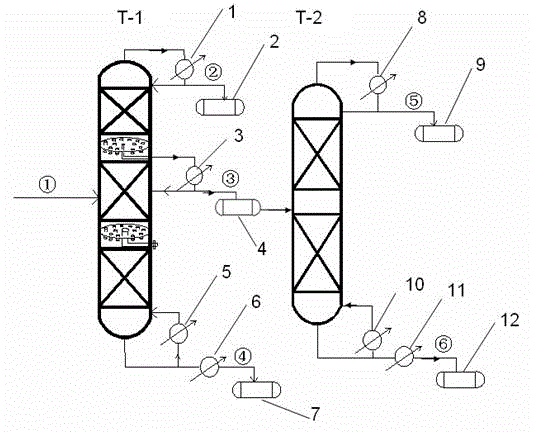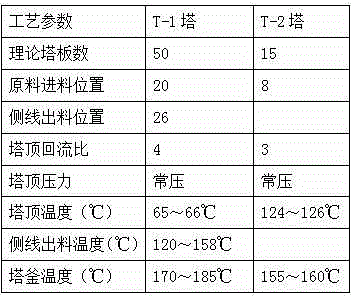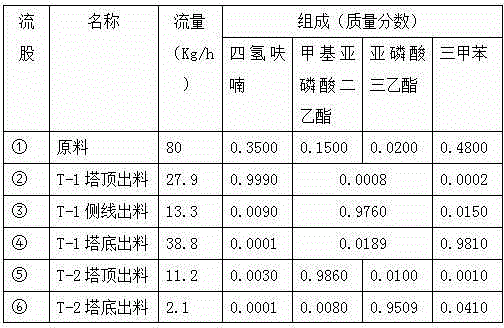A method for recovering useful components in mixed waste solvents in the production process of glufosinate-ammonium
A production process, glufosinate-ammonium technology, applied in chemical instruments and methods, organic chemistry, distillation purification/separation, etc., can solve the problems of high energy consumption, impact on glufosinate-ammonium cost, high equipment cost and operating cost, and achieve reduction Evaporation process, saving of rectification tower, effect of equipment cost and energy consumption reduction
- Summary
- Abstract
- Description
- Claims
- Application Information
AI Technical Summary
Problems solved by technology
Method used
Image
Examples
Embodiment 1
[0021] An integrated distillation method for recovering useful components such as tetrahydrofuran, diethyl methyl phosphite, triethyl phosphite, trimethylbenzene and other useful components in the mixed waste solvent produced in the production process of glufosinate ammonium. The process flow is as follows figure 1 As shown, referring to the process parameters shown in Table 1, the steps are as follows:
[0022] (1) Use the mixed waste solvent of glufosinate-ammonium production after preliminary treatment in the factory as raw material, and pump it into the sideline rectification tower;
[0023] (2) Cut the 65~66℃ fraction from the top of the sideline rectification tower, control the reflux ratio, and take the product from the top of the tower as tetrahydrofuran into the tetrahydrofuran storage tank;
[0024] (3) Cut the 120~158℃ distillate from the side line of the side line rectification tower. After the heat exchange by the heat exchanger, the reflux ratio is controlled, and the mi...
Embodiment 2
[0034] It is basically the same as embodiment 1, but the reflux ratio at the top of the sideline rectification tower T-1 is controlled to 3:1, and the reflux ratio at the top of the rectification tower T-2 is controlled to 2:1.
Embodiment 3
[0036] It is basically the same as Example 1, but the reflux ratio at the top of the sideline rectification tower T-1 is controlled at 5:1, and the reflux ratio at the top of the rectification tower T-2 is controlled at 4:1.
PUM
 Login to View More
Login to View More Abstract
Description
Claims
Application Information
 Login to View More
Login to View More - R&D
- Intellectual Property
- Life Sciences
- Materials
- Tech Scout
- Unparalleled Data Quality
- Higher Quality Content
- 60% Fewer Hallucinations
Browse by: Latest US Patents, China's latest patents, Technical Efficacy Thesaurus, Application Domain, Technology Topic, Popular Technical Reports.
© 2025 PatSnap. All rights reserved.Legal|Privacy policy|Modern Slavery Act Transparency Statement|Sitemap|About US| Contact US: help@patsnap.com



